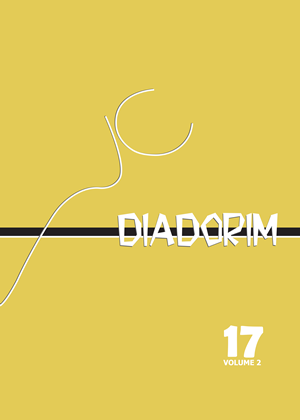INTRINSIC FUNDAMENTAL FREQUENCY RELATED TO LEXICAL STRESS IN THE SPEECH OF PEOPLE WITH PARKINSON'S DISEASE
DOI:
https://doi.org/10.35520/diadorim.2015.v17n2a4073Resumo
Intrinsic fundamental frequency (IF0) refers to a systematic difference in f0 between vowels of different heights in a similar phonetic context: high vowels tend to have higher f0 than lower vowels. Various hypotheses as to the cause of IF0 have been raised, differing mainly on the nature they attribute to the phenomenon: whether it is passive (automatic), resulting from articulatory movements that reach these segments without intending IF0 specifically; or active (controlled), deliberately generated due to reasons of perception or compensatory processes. In this article, we hope to contribute to the debate with f0 data obtained from patients suffering from Parkinson's disease (PD). 631 / a, i / vowels were analysed from recordings of an extract of text read aloud. As a result, IF0 was observed not only in participants from the control group, but also from the PD group, and the trends for participants with dysarthria were no different from those in the control group in the stressed syllable. The fact that we did not observe significant differences between the groups favours the hypothesis that IF0 is automatic. As dysarthric subjects have impaired motor control, the fact that they display IF0 with no difference from the individuals in the control group suggests that the mechanism involved in the phenomenon is similar for both. Our data does not permit us to indicate clearly which biomechanical mechanism would be the best causal explanation for these differences between high and low vowels, but they appear to be consistent with the hypotheses that emphasize the importance of tongue height.Downloads
Publicado
Edição
Seção
Licença
Transferência de direitos autorais - Autorização para publicação
Caso o artigo submetido seja aprovado para publicação, já fica acordado que o autor autoriza a UFRJ a reproduzi-lo e publicá-lo na Diadorim: Revista de Estudos Linguísticos e Literários, entendendo-se os termos "reprodução" e "publicação" conforme definição respectivamente dos incisos VI e I do artigo 5° da Lei 9610/98. O artigo poderá ser acessado pela internet, a título gratuito, para consulta e reprodução de exemplar do artigo para uso próprio de quem a consulta. Essa autorização de publicação não tem limitação de tempo, ficando a UFRJ responsável pela manutenção da identificação do autor do artigo.

A Revista Diadorim utiliza uma Licença Creative Commons Atribuição-NãoComercial 4.0 Internacional (CC BY-NC 4.0).

